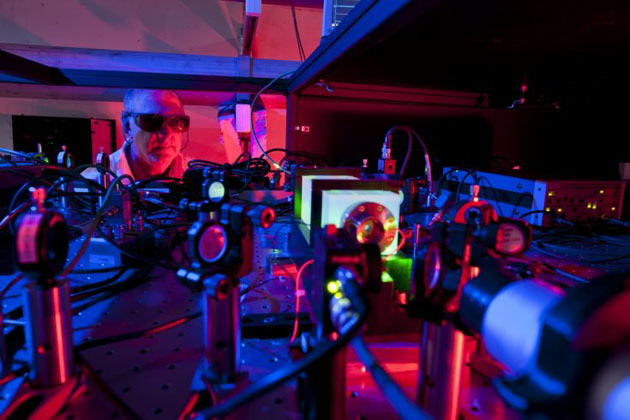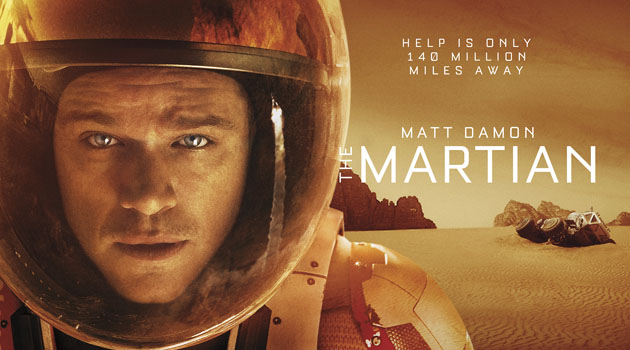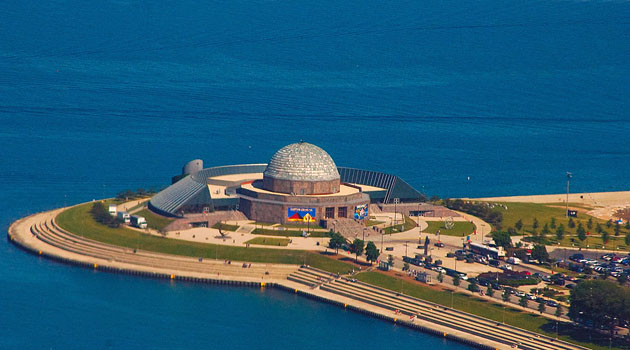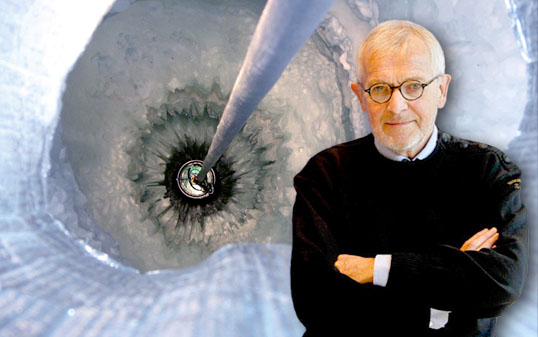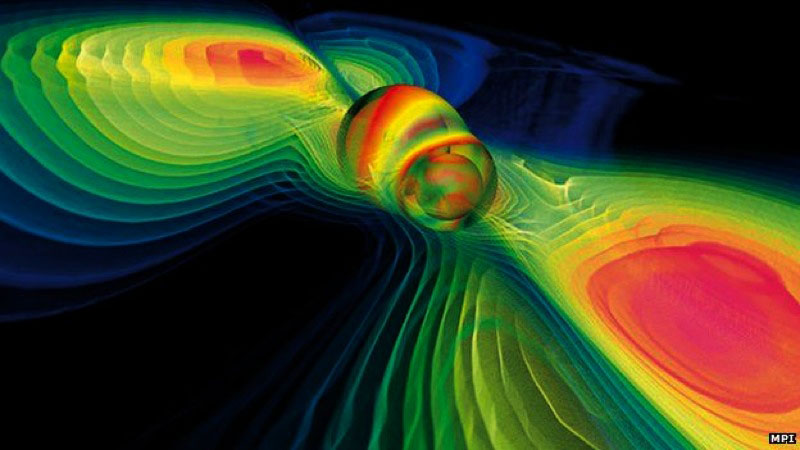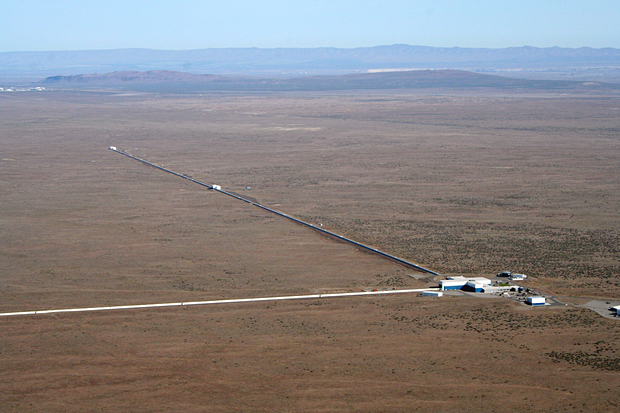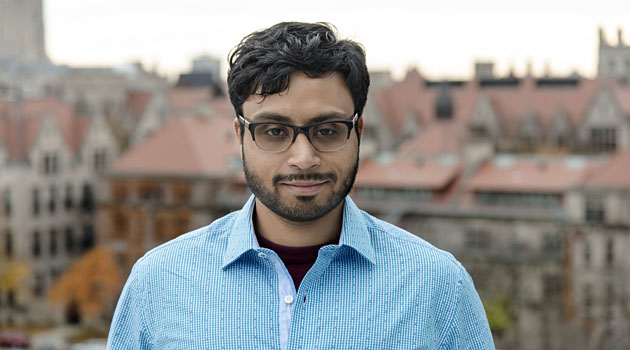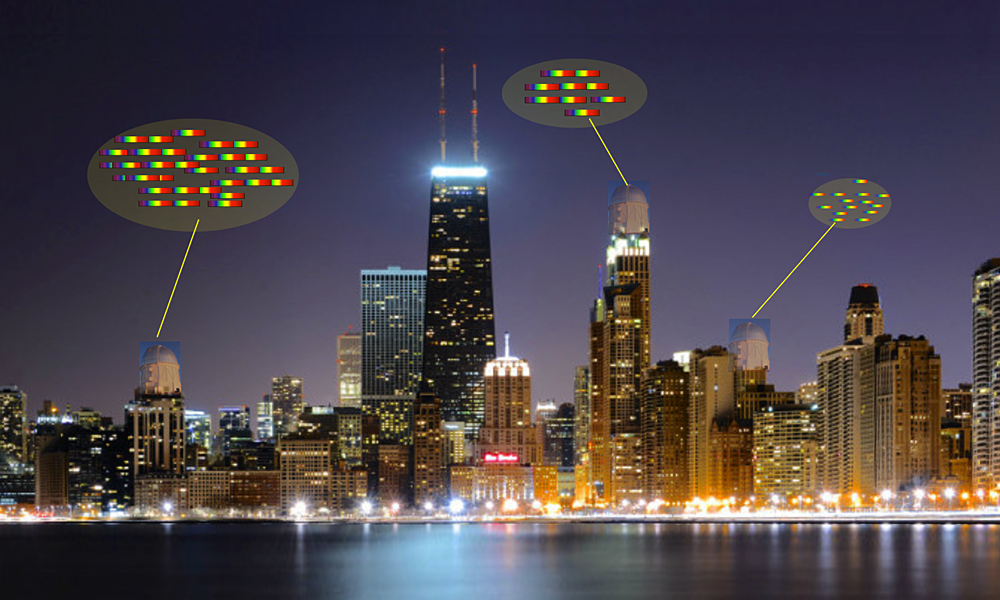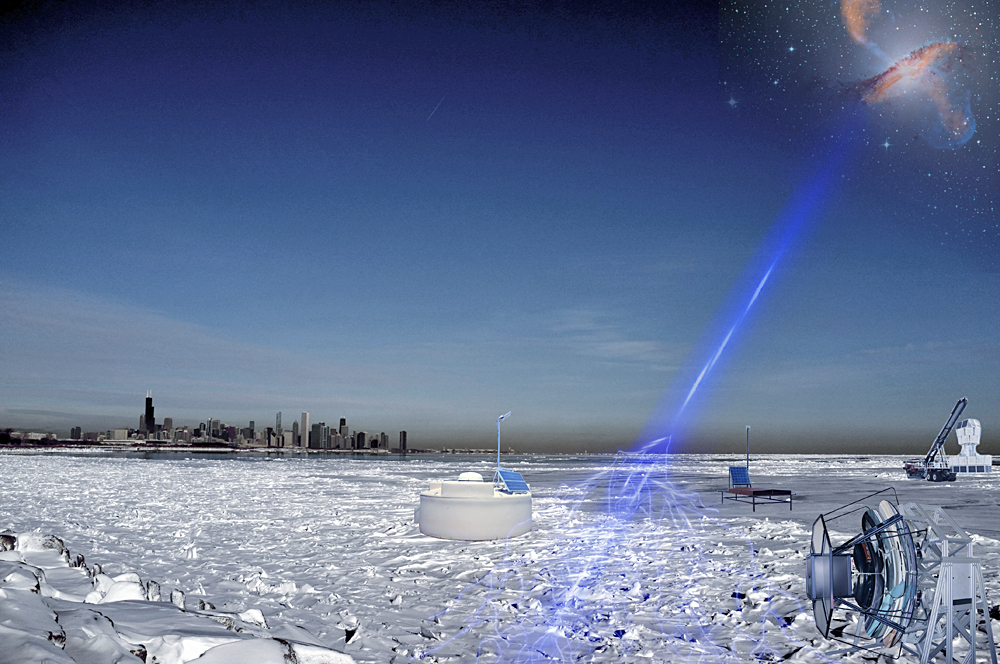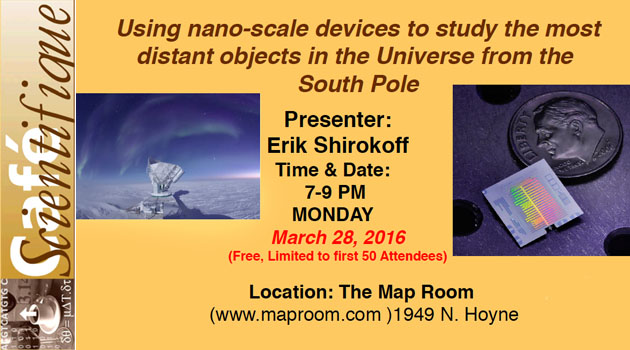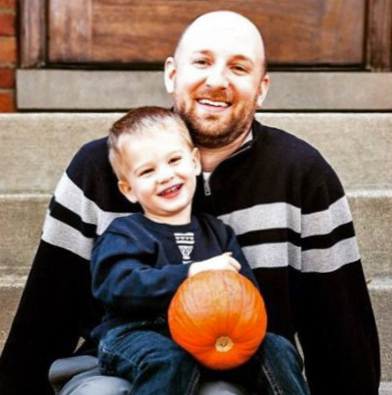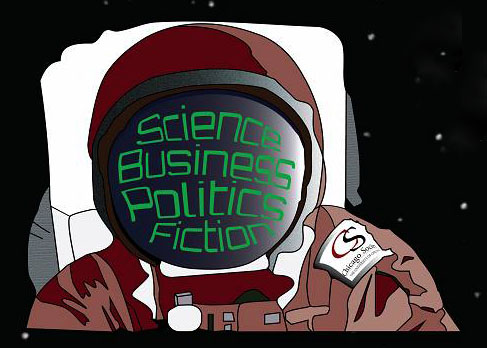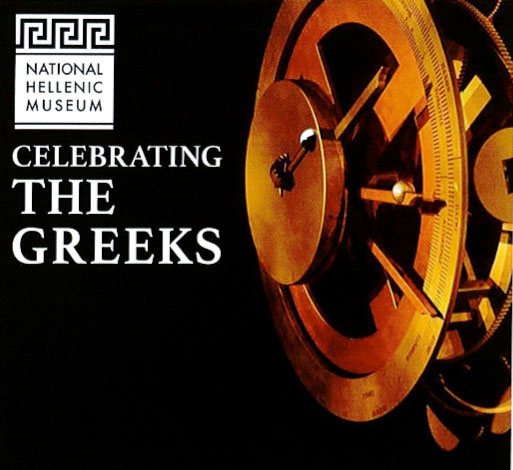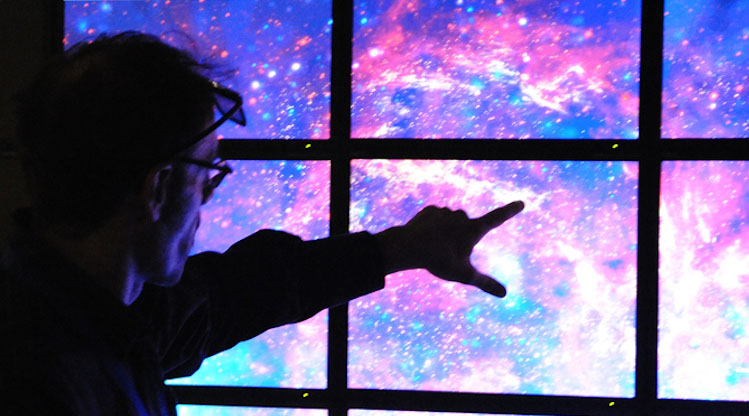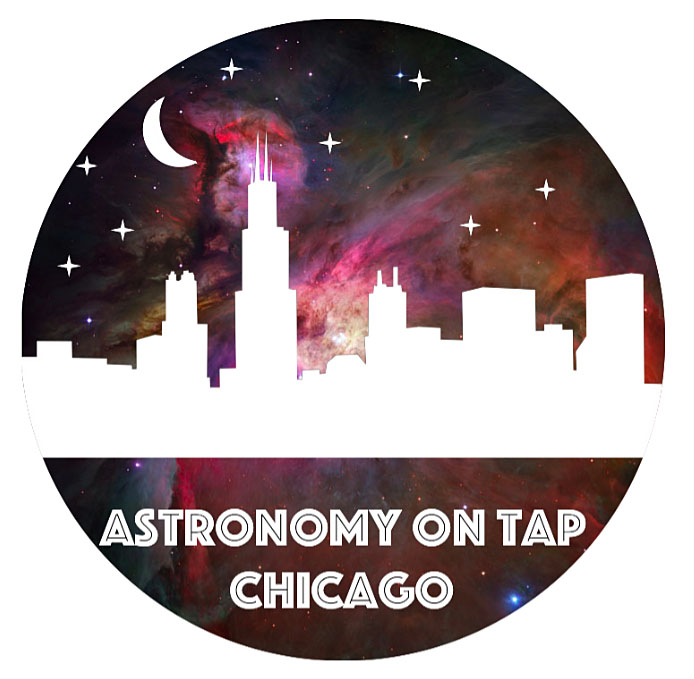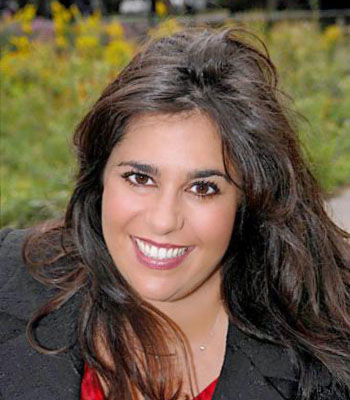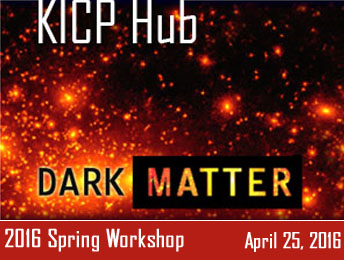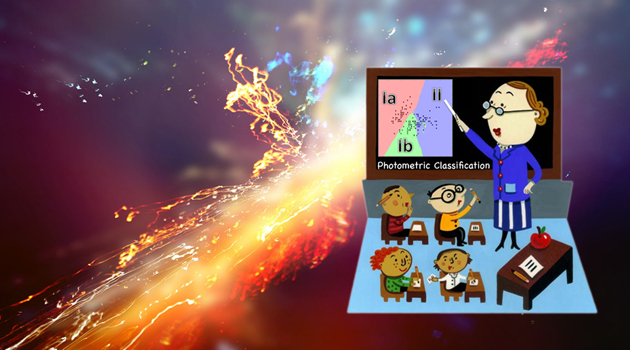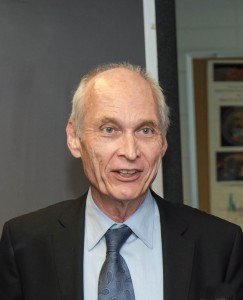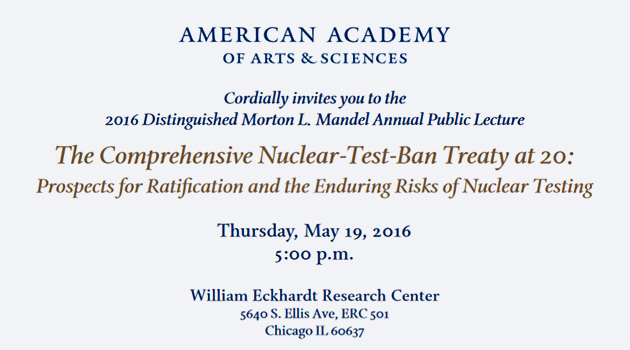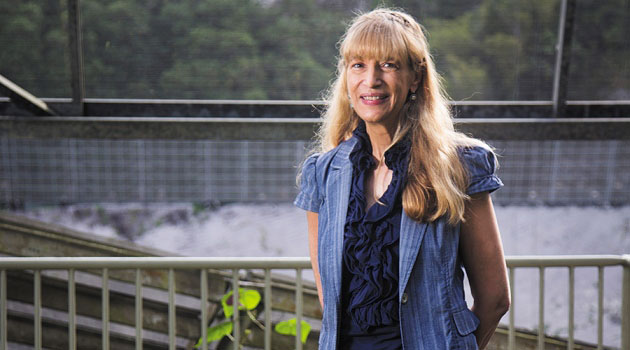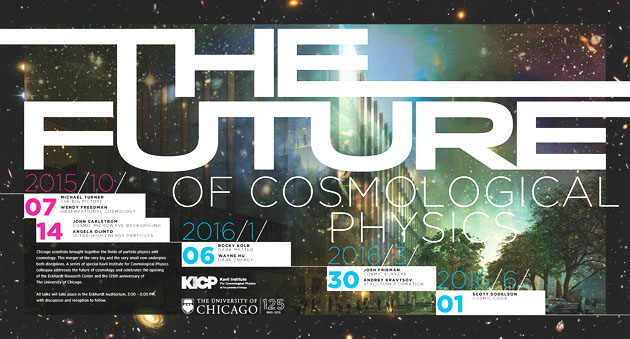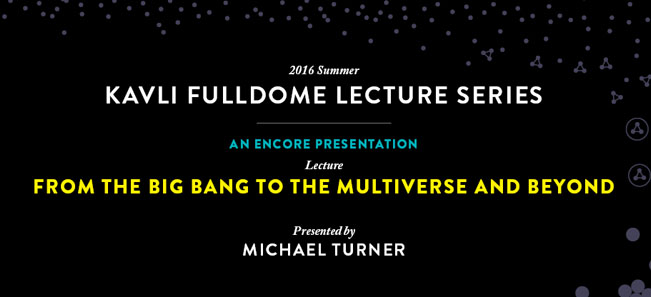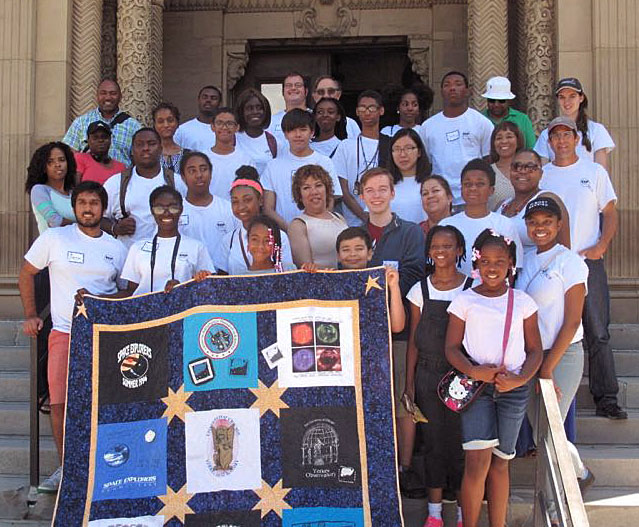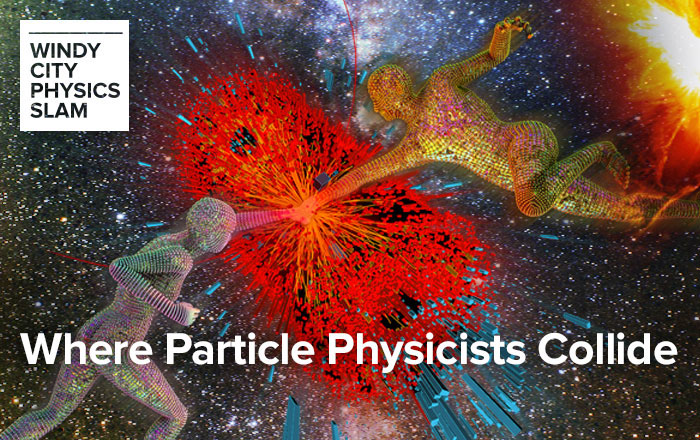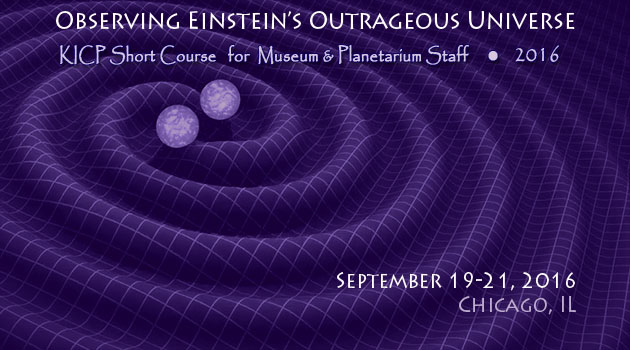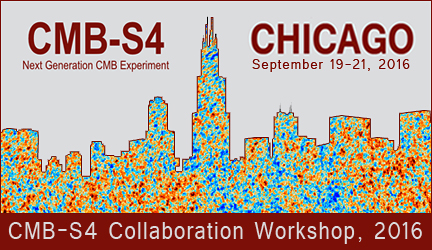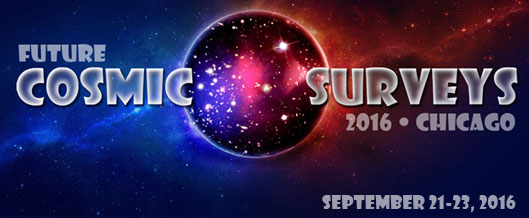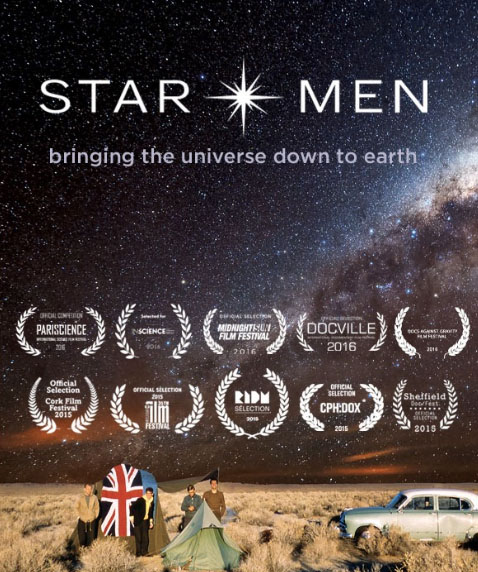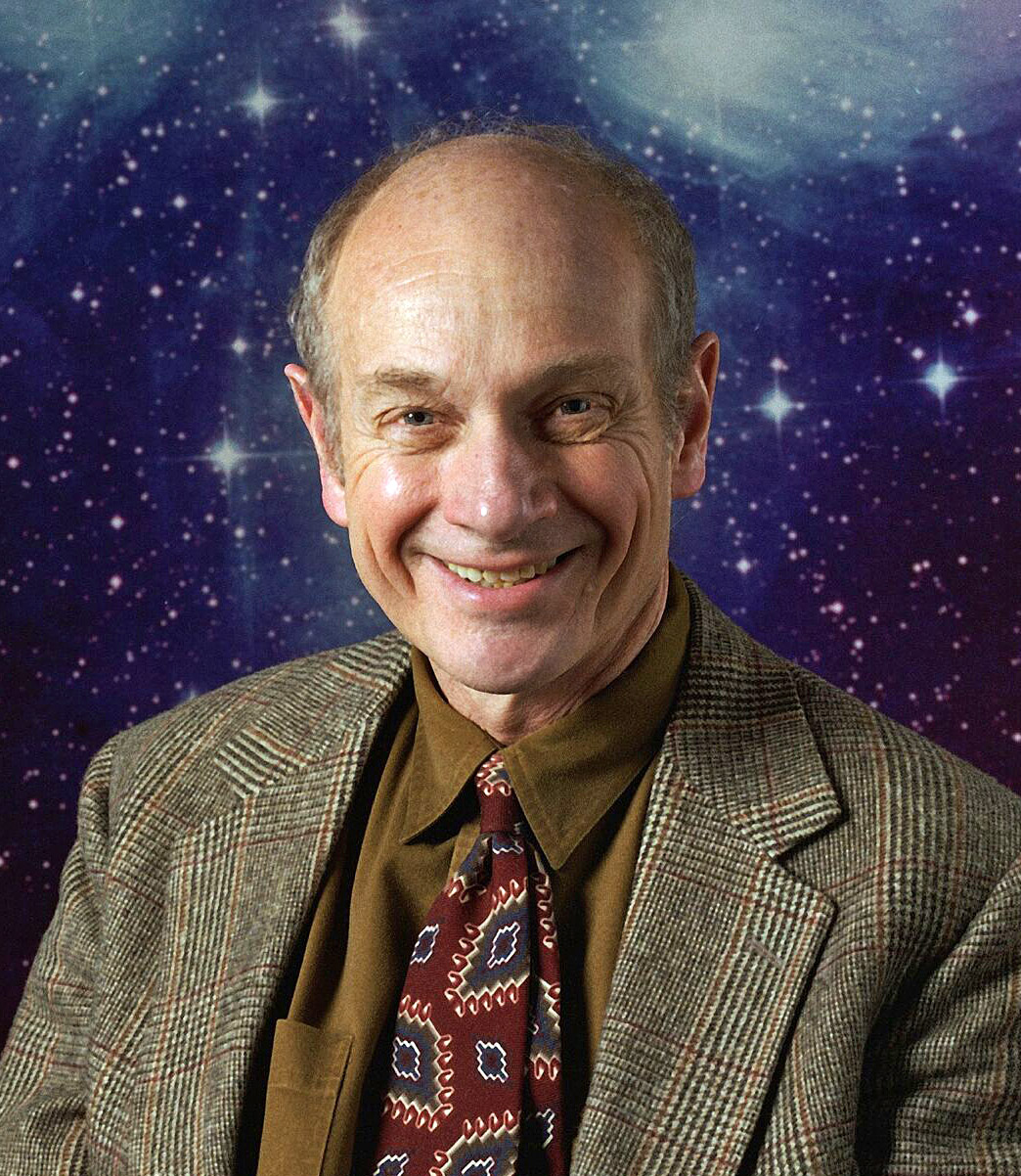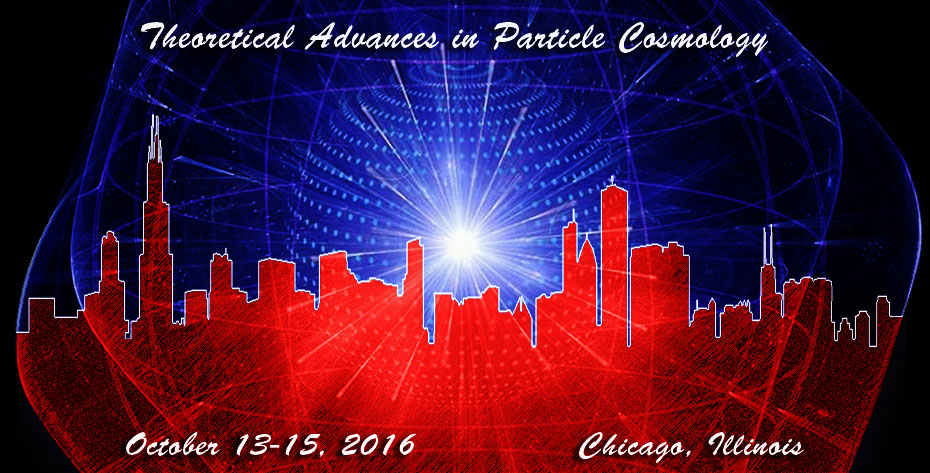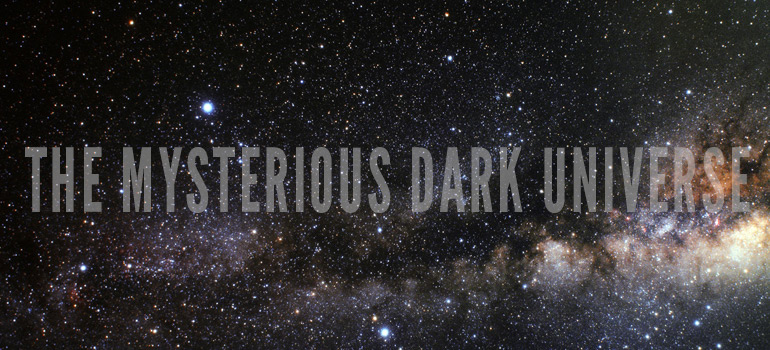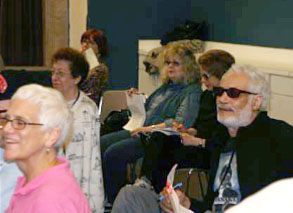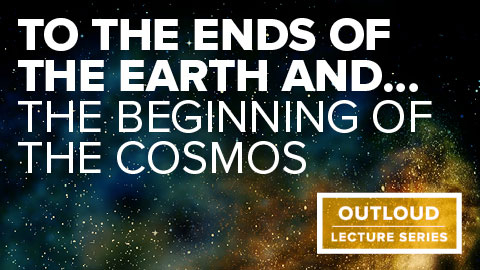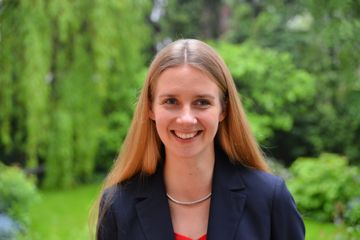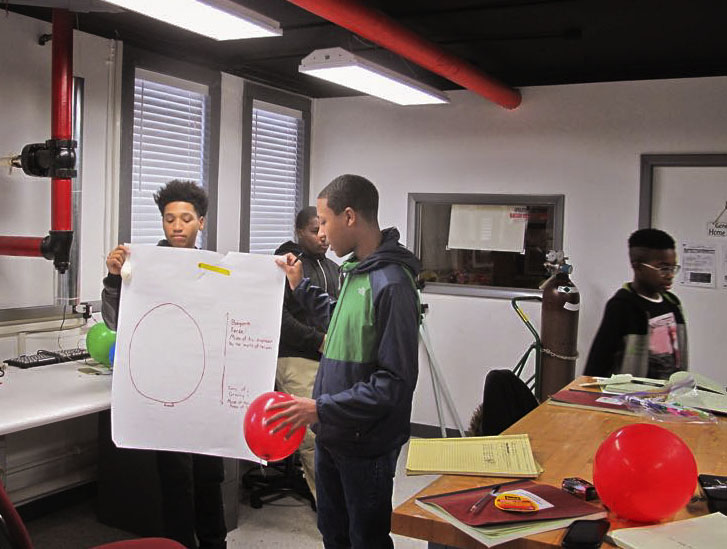 |
 |
 |
 |
 |
 |
 |
 |
 |
 |
 |
 |
|
Talks & Events
|
Workshops & Events: 2016 Physics colloquium: Stephan Meyer, University of Chicago, "First results from the Fermilab Holometer testing space-time correlations at the Planck scale" I will describe the first measurement of high-frequency differential arm length fluctuations using the Fermilab Holometer, a pair of co-located 39 m long, high power Michelson interferometers. The instrument obtains differential position sensitivity to cross-correlated signal in a broad frequency band extending above the 3.8 MHz free spectral range of the apparatus. A model of universal exotic spatial shear correlations that matches the Plank scale holographic information bound of space-time position states is excluded to 4.6 sigma significance. Science on the Screen: "The Martian" Film Screening and Discussion with UChicago planetary science experts Website Watch a screening of 'The Martian' and join the discussion afterwards about Mars, icy moons and exoplanets with University of Chicago geophysical and planetary scientists Edwin Kite and Mohit Melwani Daswani moderated by Andy Davis, Chair and Professor of the Department of Geophysical Sciences. Following are some of the topics and questions the panel will address: Galactic cosmic radiation Why is the air thin? (dust storm; launch of Mars Ascent Vehicle) Why Watney is on Mars? (sample return vs. in-situ analysis) Soil chemistry (growing potatoes) Robot-human interaction (do we need humans?) Pedro M.P. Raposo, Adler Planetarium, "Astronomy between solemnity and spectacle: the Adler Planetarium and the Chicago world exhibitions of 1893 and 1933-4" The Fishbein Workshop in the History, Philosophy and Sociology of Science Lecture Chicago hosted two epoch-making world exhibitions: the World´s Columbian Exposition of 1893, and the Century of Progress Exposition of 1933-4. Astronomy was well represented at the Columbian Exposition, with an exhibit about the US Naval Observatory, and a significant number of astronomical instruments, photographs, drawings and publications on display at the Manufactures and Liberal Arts Building. But it was even more prominent in the Century of Progress Exposition. The latter opened with a spectacular stunt in which light from the star Arcturus was used to turn on the lights of the exposition. A building named Hall of Science hosted exhibitions covering several branches of scientific knowledge, but astronomy had its focal point in the Adler Planetarium, which had been inaugurated in 1930. Concerned about the new institution becoming a mere venue for scientific entertainment, the founders of the Adler Planetarium had purchased a remarkable collection of antique scientific instruments. By doing so, they hoped that the Planetarium would rank alongside with the leading science museums in Europe. Century of Progress provided an opportunity for the Adler Planetarium to seek an appropriate balance between spectacle and cultural credibility, while affirming itself as a full-fledged astronomy museum. In this paper I will address the ways astronomy was presented in the 1893 and 1933-4 world exhibitions, in order to analyze i) the opportunities and challenges involved in the rise of modern planetaria, and particularly in the establishment of the Adler Planetarium, the first institution of its kind in America; ii) more generally, the role of planetaria and world exhibitions in shaping a public image for astronomy and astrophysics. Speaker Pedro M. P. Raposo is a curator at Adler Planetarium, Chicago. He holds a doctoral degree in History of Science by the University of Oxford. Prior to his appointment at the Adler Planetarium, Pedro was an education and outreach officer at the Astronomical Observatory of Lisbon; a Magellan Scholar at St. Catherine’s College, Oxford; a research associate of the Oxford Museum of the History of Science; a post-doctoral fellow at the CIUHCT - Inter-University Centre for the History of Science and Technology, Lisbon; an associate lecturer at the University of Lisbon; and a visiting scholar at the Max Planck Institute for the History of Science, Berlin. Pedro’s current research interests include the history of celestial cartography, the history of modern planetaria, and the material culture of timekeeping. Computations in Science Seminar: Carlo Graziani, University of Chicago, "The Biermann Catastrophe in Numerical MHD" The Biermann Battery effect is frequently invoked in cosmic magnetogenesis and in High-Energy Density laboratory physics experiments. Unfortunately, it has recently been noticed that direct implementations of the Biermann effect in MHD codes produce unphysical magnetic fields at shocks, whose value does not converge with resolution. This convergence breakdown, which has affected all Eulerian and Lagrangian MHD codes implementing the Biermann effect, is due to naive discretization, which fails to account for the fact that discretized irrotational vector fields have spurious solenoidal components that grow without bound near a discontinuity. I show that careful consideration of the kinetics of ion viscous shocks leads to a formulation of the Biermann effect that gives rise to a convergent algorithm. I also note a novel physical effect: a resistive magnetic precursor in which Biermann-generated field in the shock "leaks" resisti! vely upst ream. The effect appears to be potentially observable in experiments at laser facilities. Francis Halzen, "Ice Fishing for Neutrinos" Website Francis Halzen, 2015-2016 Brinson Lecturer Francis Halzen is a theoretical physicist who works at the interface of particle physics, astrophysics and cosmology. He is the Principal Investigator for IceCube, the world's largest neutrino detector, the Director of the Institute for Elementary Particle Physics, and the Hilldale and Gregory Breit Distinguished Professor at the University of Wisconsin-Madison. Among his recent honours are the 2015 Balzan Prize, the European Physical Society Prize for Particle Astrophysics and Cosmology in 2015; the Smithsonian American Ingenuity Award for Physical Sciences in 2014; the Physics World Breakthrough of the Year Award for making the first observation of cosmic neutrinos; and the International Hemholtz Award of the Alexander von Humboldt Foundation in Germany. 2015-2016 Brinson Lecture: "Ice Fishing for Neutrinos" IceCube is a strange telescope which looks down rather then up. It is located at the South Pole and it is BIG (a cubic kilometer) with eighty-six holes over 1.5 miles deep melted into the Antarctic icecap. IceCube recently discovered a flux of neutrinos reaching us from deep in the cosmos, with energies more than a million times greater then those humans can produce in accelerators. These energetic neutrinos are astronomical messengers from some of the most violent processes in the universe including: starbursts, giant black holes gobbling up stars in the heart of quasars and gamma-ray bursts, the biggest explosions since the Big Bang. We will explore the IceCube telescope, its recent scientific results, and working at the South Pole. This event is co-sponsored by the University of Chicago and the School of the Art Institute of Chicago. LIGO update on the search for gravitational waves Dear Colleagues, This year marks the 100th anniversary of the first publication of Albert Einstein's prediction of the existence of gravitational waves, which are ripples in the fabric of spacetime. The advanced Laser Interferometer Gravitational-wave Observatory (LIGO) has been designed to search for these waves, and has just finished its first science run. We will be hosting an event to provide an update on efforts to detect gravitational waves. The event will begin with a live stream of a press conference hosted by the National Science Foundation, immediately followed by a Q&A panel led by Associate Professor and LIGO member Daniel Holz and featuring Ben Farr, McCormick Postdoctoral Fellow in the Enrico Fermi Institute; Hsin-Yu Chen, graduate student in the Astronomy & Astrophysics; and Zoheyr Doctor, graduate student in Physics. I hope you are able to join us for coffee and a live stream of a press conference and the discussion. Rocky Kolb *Dean of the Physical Sciences* Physics colloquium: Daniel Holz, University of Chicago, "Update on LIGO and Gravitational Waves" Physics Colloquium at 4 pm February KPTC 106: KICP member Daniel Holz will speak, "Update on LIGO and Gravitational Waves" This year marks the 100th anniversary of the first publication of Albert Einstein’s prediction of the existence of gravitational waves. The advanced Laser Interferometer Gravitational-wave Observatory (LIGO) has been designed to search for these waves. We will provide an update. C2ST Speakeasy: Ritoban Basu Thakur, "Dark Matter -- The Dark Path to our Being" Website Everything we see today, our precious atoms and molecules, got here by traveling on swaths dark matter. From the oscillations of the hot plasma of the primordial universe, to the formation and dynamics of modern galaxies, dark matter plays a necessary role. The very construct in which we sit is defined by its abundance. Our universe’s evolution is controlled tightly by a cosmic tug-of-war between dark matter and dark energy. Thus understanding dark matter is not only important to explain the past and the present, but also the future trajectory of our universe. It has been over 80 years since its discovery, and we have yet to “see†dark matter directly. This talk will discuss how we came to know about dark matter and the multitude of concordant observations. Next, we will discuss our best ideas regarding the nature of dark matter and detection strategies being pursued world-wide. Dr. Ritoban Basu Thakur is an experimental cosmologist at the Kavli Institute for Cosmological Physics (KICP), at the University of Chicago. His research focuses on understanding early universe physics by precise measurements of the cosmic microwave background, and progressing experimental techniques toward terrestrial detection of dark matter. To this end, he is developing novel detectors and analyzing observational data collected via these detectors. Dr. Basu Thakur obtained his PhD in Physics from the University of Illinois at Urbana Champaign. The crux of his PhD research, on dark matter, was carried out at the Fermilab Center for Particle Atrophysics. He was URA fellow and graduate student association officer at Fermilab. He got his B.S. in Physics, and graduated Phi Beta Kappa (liberal arts and sciences) from Dickinson College. Cosmology Using Low Resolution Spectroscopy in the 2020s Website The Kavli Institute for Cosmological Physics (KICP) at the University of Chicago is hosting a workshop "Cosmology Using Low Resolution Spectroscopy in the 2020s" on February 16-17, 2016. The goal of this workshop is to evaluate the cosmological impact of future wide field low-resolution spectroscopic surveys. All of the top surveys will be represented, and the many cosmological studies that these surveys will allow will be discussed. Winter 2016 Postdocs Symposium
Next-Generation Techniques for Ultra-High Energy (UHE) Astroparticle Physics Website The Kavli Institute for Cosmological Physics (KICP) at the University of Chicago is hosting a workshop this winter on the Next-Generation Techniques for Ultra-High Energy (UHE) Astroparticle Physics. The origin of the most energetic particles in the universe could be related to extremely energetic astronomical phenomena or other exotic processes, such as the decay of the super-heavy dark matter in the halo of our galaxy or topological defects created in an early phase of the development of the universe. In order to clarify their origin, it is essential to develop next-generation techniques for detection of their particles by large amounts of statistics. The workshop will address the road map and near-future prospects of cosmic rays and neutrinos above the PeV scale. Included topics are reviews of the latest results, upcoming detectors and techniques, and related theory topics. The anticipated structure is a series of presentations with ample time for discussion and working sessions. Computations in Science Seminar: Daniel Hooper, Fermilab, "Uncovering the particle nature of dark matter" A wide range of observations support the conclusion that most of the matter in our universe is not made of protons, neutrons, or electrons, but of some other substance or substances that do not interact electromagnetically or through the strong nuclear force. For a lack of a better name, we simply call this stuff "dark matter". I'll discuss some of our best hypotheses for what dark matter might be made of, and the experimental program designed to test this list of possibilities. I'll focus in particular on searches for dark matter annihilation products using gamma-ray telescope, which may have already seen the first evidence of particle dark matter interactions. Anthony Scopatz, University of South Carolina, "Non-judgmental Code-to-Code Comparisons with Gaussian Processes and Dynamic Time Warping" This talk presents a non-judgmental analysis methodology that couples Gaussian process regression, a popular technique in Machine Learning, to dynamic time warping, a mechanism widely used in speech recognition. This method is intended to be used for code-to-code comparisons and benchmark studies for which no 'true' validation data exists or when validated data is sparse. Predictive climate models and the nuclear fuel cycle are both examples of where this method may be useful. Together Gaussian processes and dynamic time warping generate figures-of-merit for a suite of simulator results or derived metrics. These figures-of-merit have the advantage that they reduce the dimensionality of comparison to a scalar. The figures-of-merit account for uncertainty in the metric itself, utilize information across the input parameter domain, and do not require that the simulators use a common grid for the independent variables. This talk defines a distance measure that can be used to compare the performance of each simulator for a given metric. Additionally, a contribution measure is derived from the distance measure that can be used to rank order the impact of different partitions for a total metric. This talk also warns against using standard signal processing techniques for error reduction, as error reduction is better handled by the Gaussian process regression itself. This talk will walk through a representative code-to-code comparison for nuclear fuel cycle time series obtained via the DYMOND and Cyclus simulators. Additionally, potential modifications of the method for spatial warping will also be presented. Cafe Scientifique: Erik Shirokoff, "Using nano-scale devices at the South Pole to study the most distant objects in the Universe" Some of the most distant objects in the Universe can only be studied with submillimeter wavelength instruments. These ancient objects include the cosmic microwave background - relic radiation left over from the the Big Bang - and the galaxies that hosted the first generation of stars. To see these distant signals we employ microscopic superconducting devices operating a fraction of a degree above absolute zero. And to see through the earth's atmosphere, we operate telescopes in some the most remote locations on Earth, including the South Pole and the Atacama Desert. We will talk about the instruments, the remote observatories we're building, and what we hope to reveal with them. Broader Horizons: Joshua Carter, quantitative analyst at Citadel in Chicago I joined Citadel as a quantitative researcher in 2013 after completing a Hubble Fellowship. Citadel is a Chicago-based global financial institution offering asset management, retail execution/market making and trading technologies. Quantitative researchers (or "quants") are responsible for developing, testing and maintaining sophisticated, automated trading models. I will give a candid overview of this sector, giving my personal experience and offering advice for a similar transition. UChicago Conference: "Space: Speculation and Exploration" Website The University of Chicago's Conference titled "Space: Speculation and Exploration" is a day long event, hosting speakers from across the country. The conference aims to inspire public fascination and contemplation of the universe by connecting renowned professors and experts on space from various fields of science, economics, politics, and fiction with University of Chicago students and community members. KEYNOTE Robert Rosner- University of Chicago Professor in Astronomy and Astrophysics and Physics SCIENCE PANEL Jay M. Pasachoff- Williams College Professor in Astronomy Brian Fields- University of Illinois Professor in Astronomy Grace Wolf-Chase- Adler Planetarium Astronomer Zoltan G. Levay - Imaging Group Lead in the Office of Public Outreach at Space Telescope Science Institute Scott Sandford- NASA Astrophysicist BUSINESS AND POLITICS PANEL Eligar Sadeh- CEO of Astroconsulting Charles Blandchard- former General Counsel of the Air Force and the Army David Livingston- Host of The Space Show FICTION PANEL Eric S. Rabkin- University of Michigan Professor of English Language and Literature and Professor of Art & Design Robert J. Scherrer- Vanderbilt University Professor and Chair of the Department of Physics and Astronomy and science fiction blogger John Hemry- New York Times Best Selling Author of The Lost Fleet series Robert Buettner- National Bestselling Author of Jason Wander and Orphan's Legacy series Joshua Frieman in the Deborah Stratman film "The Illinois Parables" Website For the last 25 years, Deborah Stratman (BFA 1990) has explored the landscape of our national history and psyche in riveting films, sculpture, sound, and public works. With THE ILLINOIS PARABLES, she turns her attention to the “American microcosm†and its storied past. Bracketed by sweeping aerial shots of the state’s ancient prairies and waterways, Stratman spins eleven tales of natural disaster, messianic devotion, technological breakthrough, government resistance, and unsolved mystery. Together, these stories ask how the systems of belief they represent have shaped how we see the land, ourselves, and our nation. 16mm. (Amy Beste) The World's Oldest Computer: The Antikythera Mechanis Website More than 21 centuries ago, Greek scientists created a mechanism that used brass gearwheels to predict the movements of the sun, the moon, and probably most of the planets, essentially inventing the world's first computer. Found by Greek sponge divers in an ancient shipwreck, its corroded remnants, now known as the Antikythera Mechanism give us fresh insights into history and challenge our assumptions about technology transfer over the ages. Dr. John Seiradakis, Radio Astronomer and Physics Professor at the Aristotle University of Thessaloniki, Greece, will discuss the work of an international team of experts who used 21st century technology to decode the truth behind the world's first computer. This program will also feature the artwork of two local artists inspired by the Antikythera Mechanism: Terry Poulos and Keith Skogstrom. Astronomy Conversations Training Session Join us for a volunteer training session where you will learn about the Astronomy Conversations Program, the Adler Space Visualization Lab and science communication techniques. SVL and Astronomy Conversations Chicago Astronomy on Tap This Monday, April 18, is the inaugural Chicago Astronomy on Tap! For those who are unfamiliar with the concept, Astronomy on Tap is a public outreach initiative at bars across 10 US cities (and Santiago, Chile) that involves informal astronomy talks and astronomy trivia (and beer!). This event will be held at The Map Room (off the blue line, 1949 N. Hoyne) at 7 pm, and Laura will be giving a talk on 'Prospects for Detecting Alien Life in the Next Decade.' We hope to see you there! Astrophysics for Older Adults Presenters: Karen Kolb Flude, Daniel Grin. Beginning in 2013, the KICP has developed an astrophysics outreach effort to older adults (formerly known as senior citizens). This program has brought fundamental and cutting-edge content in astronomy to older adults at Chicago senior centers, retirement homes, and public libraries. The material has been presented by graduate students, postdocs, and faculty at the KICP, the University of Chicago's Astronomy/Astrophysics Department, Physics Department, and even broader pool including biologists at the UofC, as well as scientists at FermiLab, the Adler Planetarium, and the Field Museum. After briefly introducing the program, we'll cover how to effectively reach out to this audience. This event is a perfect entry point to participate in the program! After a ~1 hour presentation, participants will have an opportunity to present slides for critique and improvement, and discuss the program more informally. Dark Matter Hub workshop We are hosting our spring KICP dark matter hub meeting on April 25. We will start at 10:30 am and end 2:30 pm (Note that we are starting later than the previous meetings). It will be held in Room 401, Eckhardt Research Center building. We will have box lunches for the participants. This hub meeting will focus on direct detection. After the talks, we will have a discussion at the end on possible new directions to pursue and cooperate.
Photometric Classification of SNIA Website The Kavli Institute for Cosmological Physics (KICP) at the University of Chicago is hosting a workshop on the Photometric Classification of SNIA on April 28-29, 2016. This workshop will focus on Photometric classification methods and validation techniques for large SNIA data samples. The emphasis will be on defining samples that can be used to measure cosmological parameters, rate vs redshift, and SN-host correlations. Kavli Lecture: Michael Turner, "From The Big Bang To The Multiverse & Beyond" Michael Turner, Director of the Kavli Institute of Cosmological Physics and the Bruce V. and Diana M. Rauner Distinguished Service Professor at the University of Chicago WebsiteLecture Flyer [PDF] 7:30 pm - 9:00 pm: Lecture and Q&A Session 9:00 pm - 10:00 pm: Speaker Reception with Refreshments Presented by The Kavli Foundation The Kavli Foundation fulldome lecture will be streamed live at fourteen other institutions including the American Museum of Natural History (NY, NY), the Denver Museum of Nature and Science and the Pacific Science Center (Seattle, WA). This dome-cast will allow audiences across the country to immerse themselves in the presentation in real time and ask questions. We know the Universe began 13.7 billion years ago in an explosion of space called the Big Bang. We also know that the gravity of dark matter created the galaxies and other cosmic structures we see today from tiny quantum fluctuations that arose just after the Big Bang. Yet some big questions remain. Is our Universe part of a larger multiverse? What is speeding up the expansion of the Universe? These are the mysteries that inspire cosmologists today. In a dazzling, fulldome presentation, this presentation will illustrate what we know and how we know it, as well as the big ideas and puzzles of cosmology today. On May 5, the University of Chicago's Michael Turner will explore some of the biggest mysteries in modern cosmology. About Michael Turner Michael S. Turner is a theoretical astrophysicist and the Bruce V. and Diana M. Rauner Distinguished Service Professor at the University of Chicago. He is also Director of the Kavli Institute for Cosmological Physics at Chicago. Turner helped to pioneer the interdisciplinary field of particle astrophysics and cosmology, and has made seminal contributions to the current cosmological paradigm known as "LambdaCDM", including the prediction of cosmic acceleration. His current research interests are dark matter, dark energy and inflation. Turner has won numerous prizes and is a member of the National Academy of Sciences. About the Kavli Fulldome Lecture Series The Kavli Fulldome Lecture series takes audiences on a journey to the very edges of human knowledge. Adler experts and leading scientists work together to create dazzling, animated images of real data, which are projected onto the planetarium dome during the lectures. Audiences don't have to imagine what an equation might tell us about the Universe’s distant past, they can travel back in time and see it with their own eyes. Current list of institutions participating in the dome-cast:
Graduate Student Symposium Hello everyone! We are excited to invite you to the second KICP Graduate Student Symposium that will take place *May 12th from 12-2:00pm.* Last year was a great success and we hope that you will join us again this year. We will have tasty foods being served before we kick things off from 11:30 until 12 Schedule:
Broader Horizons: Korey Haynes, associate editor at Astronomy Magazine After completing my PhD at George Mason University studying exoplanets, I joined the staff of Astronomy in December 2014. Astronomy is the largest general level magazine of its type, serving fans of both the science and hobby sides of the field. As an editor, I work closely with scientists and science writers to make stories ready for publication, write for print and the web, and manage large tracts of our website. I will talk about my experiences in the field, and address specifically the transition from scientist to science communicator. The Comprehensive Nuclear-Test-Ban Treaty at 20: Prospects for Ratification and the Enduring Risks of Nuclear Testing The AAAS 2016 Distinguished Morton L. Mandel Annual Public Lecture, which will be livestreamed in the Astro Lounge on Thurs. May 19 at 5 pm. "The Comprehensive Nuclear-Test-Ban Treaty at 20: Prospects for Ratification and the Enduring Risks of Nuclear Testing" Twenty years after the signing of the Comprehensive Nuclear-Test-Ban Treaty (ctbt) and creation of its accompanying organization, the Comprehensive Nuclear-Test-Ban Treaty Organization (ctbto), the ctbt remains extremely relevant in the context of nuclear proliferation, deterrence, testing, and more. Yet challenges also remain that impede the ratification of the treaty and its entry into force. On Thursday, May 19, 2016, the American Academy invites you to participate in a discussion on nuclear testing and the prospects of the ratification of the Comprehensive Nuclear-Test-Ban Treaty. Participants at the University of Chicago will watch a livestream of a panel discussion held at the American Academy's headquarters in Cambridge, MA, featuring the speakers listed below. Following the panel discussion, Rachel Bronson will moderate a dynamic discussion at the University of Chicago. Lassina Zerbo Executive Secretary, Preparatory Commission for the Comprehensive Nuclear-Test-Ban Treaty Organization Rose E. Gottemoeller Under Secretary for Arms Control and International Security, U.S. Department of State Robert Rosner William E. Wrather Distinguished Service Professor in the Departments of Astronomy & Astrophysics and Physics, and the Enrico Fermi Institute and the Harris School of Public Policy Studies, University of Chicago Siegfried Hecker Senior Fellow, Freeman Spogli Institute for International Studies; Research Professor of Management Science and Engineering, Stanford University Arun Rath Correspondent, npr and wgbh Rachel Bronson Executive Director & Publisher Bulletin of the Atomic Scientists Featuring Joan Schmelz, Acting Director of Arecibo Observatory and Director of the Solar Physics Lab at the University of Memphis, "Unconscious Bias in Hiring, Promotions, and Tenure" PDF We all have biases, and we are (for the most part) unaware of them. Unconscious bias is NOT prejudice. In fact, men and women both unconsciously devalue the contributions of women. This can have a detrimental effect on grant proposals, job applications, and performance reviews. For example, when evaluating identical application packages, male and female university psychology professors preferred 2:1 to hire "Brian" over "Karen" as an assistant professor. When evaluating a more experienced record, at the point of promotion to tenure, reservations were expressed four times more often about "Karen" than about "Brian." This unconscious bias has a repeated negative effect on "Karen's" career. In this talk, I will introduce the concept of unconscious bias, review the studies that uncovered it, and give recommendations on how to address it. The process of eliminating unconscious bias begins with awareness, then moves to policy and practice, and ends with accountability. Spring 2016 Postdocs Symposium
The Future of Cosmological Physics: Scott Dodelson, "Cosmic Coda" Chicago scientists brought together the fields of particle physics and cosmology. This merger of the very big and the very small now underpins both disciplines. A series of special Kavli Institute for Cosmological Physics colloquia addresses the future of cosmology and celebrates the opening of the Eckhardt Center and the 125th anniversary of the University of Chicago. All talks will take place in the Eckhardt Auditorium, 3-5PM, with discussion and reception to follow.
The 2016 Summer Kavli Fulldome Lecture: Michael Turner, "From The Big Bang To The Multiverse And Beyond" Website We know the Universe began 13.7 billion years ago in an explosion of space called the Big Bang. We also know that the gravity of dark matter created the galaxies and other cosmic structures we see today from tiny quantum fluctuations that arose just after the Big Bang. Yet some big questions remain. Is our Universe part of a larger multiverse? What is speeding up the expansion of the Universe? Theoretical astrophysicist Michael Turner has devoted his life and research to the pursuit of the answers to these questions. On July 31, the esteemed University of Chicago Professor will return to the Adler Planetarium for a reprise of the lecture that he delivered to a sold-out crowd on May 5. In a dazzling, fulldome presentation custom-made by the Adler's Space Visualization Lab, this presentation will illustrate what we know and how we know it, as well as the big ideas and puzzles of cosmology today. As an important feature of the Kavli Fulldome Lecture Series, Turner's presentation will be live domecasted from the Adler to other planetaria around the country and the world. Stay tuned as locations are added. About Michael Turner Michael S. Turner is a theoretical astrophysicist and the Bruce V. and Diana M. Rauner Distinguished Service Professor at the University of Chicago. He is also Director of the Kavli Institute for Cosmological Physics at Chicago. Turner helped to pioneer the interdisciplinary field of particle astrophysics and cosmology, and has made seminal contributions to the current cosmological paradigm known as "LambdaCDM", including the prediction of cosmic acceleration. His current research interests are dark matter, dark energy and inflation. Turner has won numerous prizes and is a member of the National Academy of Sciences. About The Kavli Fulldome Lecture Series The Kavli Fulldome Lecture series takes audiences on a journey to the very edges of human knowledge. Adler experts and leading scientists work together to create dazzling, animated images of real data, which are projected onto the planetarium dome during the lectures. Audiences don’t have to imagine what an equation might tell us about the Universe's distant past, they can travel back in time and see it with their own eyes. Sponsor: The Kavli Foundation Spy vs. Spy, Yerkes Summer Institute Instructors: Camille Avestruz, Zoheyr Doctor, Gourav Khullar, Richard G. Kron, Randall H. Landsberg, James Lasker, Phil Mansfield, Sam Passaglia, Rebecca Pierce, Jason Poh. The 2016 Yerkes Summer Institute (YSI) was filled with secrecy, deception, and espionage. At YSI, high school students in the Space Explorers program played the role of 20th-Century spies to handle secret information: revealing, concealing and distorting information. Through three day-long lab activities, the students explored connections between spying and science. In the "Secret Photos" lab, they studied angular size, resolution, and the film-development process in order to effectively gather information on "enemy operatives" using 35 mm cameras. In the "Radio Beams" lab, students designed, built, and tested a system to transmit audio via an amplitude-modulated (AM) laser, which allowed them to secretly communicate across long distances. Lastly, techniques to securely communicate were examined in the "Codes and Ciphers" lab, which also served as an introduction to modern cryptography. After cycling through these three day labs, the students broke into three new groups and took one of the labs a step further: one group doctored photographs to spread false information, another built AM radio transmitters and receivers, and the last created treasure hunts using codes and ciphers for the clues. Nighttime activities included: observations with the Yerkes telescopes, astrophotography, explorations of the constellations which focused on what current research can tell us about them (e.g. most know exoplanets were found by Kepler in the constellation Cygnus); and bad weather activities that included examinations of the veracity of viral internet photos, and stories of famous spies. The week's spy-themed activities not only introduced the students to the importance of privacy in the digital age, but also to the concepts and skills that are integral to any modern STEM career. Windy City Physics Slam: Where Particle Physicists Collide Website Come see five particle physicists from around the world put on a show about the mysteries of the universe. In a high-energy competition, they'll share the mysteries of dark matter and dark energy, shine a light on ghostly neutrinos, and uncover the very structure of the universe. Host Tom Skilling, WGN-TV chief meteorologist Featured Speakers
"Observing Einstein's Outrageous Universe", Short Course for Museum & Planetarium Staff Website Observing Einstein's Outrageous Universe: Gravitational Waves, Black Holes, Neutron Stars, Gravitational Lenses and the Big Bang Who Should Attend: Museum & Planetarium Staff What to Expect:
Course Description A century ago Einstein put forth his theory of gravity. For the first 50 years it was an exotic theory with many untestable predictions thought to be irrelevant to our Universe. Beginning 50 years ago with the discovery of quasars and the cosmic microwave background (CMB), it has become clear that we live in Einstein’s Universe where the extraordinary is now the ordinary and his theory is in full bloom. To study the Universe today you have to understand the cosmic implications of Einstein's theory. We will focus on observable aspects of some of the most outrageous and compelling predictions of general relativity. These predictions include black holes, gravitational waves, gravitational lensing, and the Big Bang. We will explore the recent detection of gravitational waves from the merger of black holes 30 times the mass of our Sun, the spectacular fireworks associated with the death of stars and the formation of neutron stars and black holes, precise measurements of properties of the supermassive black hole at the center of our galaxy, the bending of light due to the gravity of clusters of galaxies, and how we learn about the origin of space, time, and the earliest moments of the Universe. CMB-S4 Collaboration Workshop Website This is the fourth of a series of biannual "Cosmology with CMB-S4" workshops dedicated to developing the next generation ground-based Cosmic Microwave Background program, CMB-S4. The first two days of the workshop are dedicated to CMB-S4. The third day will be an overlap day with the "Futures Cosmic Surveys", which is being held at Chicago September 21-23. The CMB-S4 workshop will start with a review of the science case presented in the recently completed first edition of the CMB-S4 Science Book, followed by sessions dedicated to working on refining the science driven requirements for the CMB-S4 instrumental configuration. We will review the set of instrumentation white papers, now being drafted, that summarize the current state of relevant technologies for CMB-S4 and identify R&D efforts to advance them for evaluation for possible use in CMB-S4. We will work on the road map to determine the instrumental configuration of CMB-S4. The goal of the overlap day (Wednesday September 21) with the "Cosmic Surveys" workshop is for the two communities to update each other on their future plans and to explore the synergistic and joint analysis of the combined data sets. Future Cosmic Surveys Website On September 21-23, KICP will be holding a workshop on Future Cosmic Surveys. The workshop is intended to gather community input and support for five potential future projects, outlined in "Cosmic Visions Dark Energy: Science", produced by the DOE group. Related ideas were presented in the National Academies sponsored Elmegreen report; the recent NOAO/Kavli sponsored study; and the NRAO 2020 Futures Program. The first day will be an overlap day with the CMB-S4 workshop preceding it; Thursday will be devoted to plenary talks about the five potential projects; Friday morning, we will break up into groups for each project and formulate a plan for developing the case for the projects; we come together Friday afternoon to hear and comment on the individual plans. Topics:
Screening & Discussion: STARMEN Website The screening will included a conversation with Director Alison Rose, Kavli Prize Laureate Donald Lynden-Bell, KICP Director Michael Turner, and KICP associate director John Carlstrom. Sponsored by: The Kavli Institute for Cosmological Physics (KICP) and The Kavli Foundation STARMEN EFI colloquium: John Carlstrom, "Cosmic Microwave Background measurements through the Next Decade" We will review the current status of cosmic microwave background (CMB) measurements and the planning for the experimental program for the next decade. The talk will focus on the science case and the path forward for the stage 4 ground - based experimental program, CMB - S4, as recommended by P5. The upcoming extremely sensitive CMB measurements will allow us to stringently test the cosmological model and investigate extensions to it. We will be searching for inflationary gravitational waves and rigorously testing single field slow roll inflation, determining the neutrino mass scale, searching for new relic particles, mapping the universe in momentum, investigating dark energy, testing general relativity and more. A Celebration of the Life and Work of James W. Cronin Website A Celebration of the Life and Work of James W. Cronin Friday, September 30, 2016 2:00 p.m. Science Symposium William Eckhardt Research Center, Room 161 5640 S Ellis Avenue, Chicago, Illinois Saturday, October 1, 2016 10:30 a.m. Memorial Service Reflections from family, friends, and colleagues Rockefeller Chapel 5850 S Woodlawn Avenue, Chicago, Illinois 12:00 p.m. Reception Luncheon Ida Noyes Cloister Club 1212 E 59th Street, Chicago, Illinois Theoretical Advances in Particle Cosmology Website Kavli Institute for Cosmological Physics (KICP) is hosting a workshop "Theoretical Advances in Particle Cosmology" this fall on the University of Chicago campus. The workshop will bring together theorists with common interests in early universe cosmology and high energy particle physics. Topics:
2016 Leon Lederman Lecture: Rocky Kolb, "The Mysterious Dark Universe" Website Edward W. "Rocky" Kolb of the University of Chicago will give the 2016 Leon Lederman Lecture in Physics on Monday, October 24 from 3:30-5 p.m. in the Robert A. Pritzker Science Center, Room 111. Kolb is the Arthur Holly Compton Distinguished Service Professor of Astronomy & Astrophysics at Chicago. The eminent cosmologist studies the application of elementary particle physics to the very early universe. In his lecture "The Mysterious Dark Universe," he will explore how the answer to the question of what the universe is made of is not simple. Astronomical observations tell us that 95 percent of the universe is missing. Most of the mass of the universe is in a mysterious form known as dark matter, and most of the energy in the universe is in an even more mysterious form known as dark energy. Dark matter and dark energy will determine the ultimate fate of our universe, Kolb says; understanding the nature of the dark universe is the biggest challenge facing cosmology today. Kolb is a member of the Enrico Fermi Institute and the Kavli Institute for Cosmological Physics at Chicago, as well as dean of physical sciences. In 1983, he helped to found the Theoretical Astrophysics Group and in 2004 was the founding director of the Particle Astrophysics Center at Fermi National Accelerator Laboratory. He is a fellow of the American Academy of Arts and Sciences and the American Physical Society, among many other awards and honors. In addition to over 200 scientific papers, he is a co-author of The Early Universe, the standard textbook on particle physics and cosmology. Read more. "Rocky Kolb is an excellent and accomplished astro-particle physicist with an outstanding ability to make complex concepts understandable to the public,” said Grant Bunker, chair and professor of physics. The lecture is sponsored by the Department of Physics and honors physicist Leon Lederman, who won the Nobel Prize in Physics in 1988 with Melvin Schwartz and Jack Steinberger and was the Pritzker Professor of Physics at Illinois Tech from 1992-2012. Members of the physics faculty and others have pledged money to permanently endow the Lederman lecture. Cafe Scientifique: Dan Scolnic, "Tension in the Universe: Dark Energy, Dark Matter & Different Numbers" Dear Cafe Denizens, As we transition from summer into fall, I am happy to announce our autumn cafe scientifique and an astronomy related movie screening. "Tension in the Universe: Dark Energy, Dark Matter & Different Numbers" Dan Scolnic Time & Date: 7-9 PM Monday October 24, 2016 Location: The Map Room, 1949 N. Hoyne (Free, Limited to first 50 Attendees) (others can join the cafe email list at - Cafe Email list: http://tinyurl.com/cafelist ) Life Long Learning Training Session In conjunction with the KICP Life Long Learning program, we are hosting a training session focused on working with older adults. Gerontologist Karen Kolb will conduct a workshop that will explore demographic trends, the physiology and psychology of aging, and practical considerations for presenting to older adults. Argonne OutLoud: Clarence Chang, "To the ends of the Earth...and the beginning of the cosmos" Website The depths of the cosmos can only be matched by the innumerable questions we have about it. Scientists have attempted for hundreds of years to gain a clear picture of how the universe was formed. Our current understanding of it is the best so far, but there is still so much more to know. But just how do researchers study the beginning the universe? Physicist Clarence Chang (Argonne National Laboratory and Kavli Institute for Cosmological Physics at the University of Chicago) collaborates with a group of researchers using the South Pole Telescope, which is equipped with a unique Argonne-made sensor technology to measure and characterize thermal radiation signatures generated billions of years ago. He will also provide highlights of his research travels to the Antarctica and the South Pole. Physics colloquium: Elisabeth Krause, Stanford University/SLAC, "Dark Energy Science with the Dark Energy Survey, and Beyond" The accelerated expansion of the Universe is the most surprising cosmological discovery in decades. It has inspired a new generation ambitious surveys to determine the fundamental nature of this acceleration - whether it is caused by a breakdown of general relativity, or by an exotic new form of energy, termed dark energy, that acts repulsively within general relativity. I will introduce the different measurement techniques used by these surveys, and describe the landscape of current and near future cosmological sky surveys, highlighting early results from the ongoing Dark Energy Survey. The unprecedented data quality and data volume of future surveys will require a new generation of analysis frameworks, and I will conclude by outlining some of the statistical and computational challenges for the interpretation of these data sets. Fall 2016 Postdocs Symposium
Up & Down, Yerkes Winter Institute Instructors: Randy Landsberg, Phil Mansfield, Eric Oberla, and Erik Shirokoff. The 2016 Yerkes Winter Institute (YWI) focused on the forces that lift objects up and what happens when they are pushed down. Twenty local high schoolers in the Space Explorers program participated in three labs led by Erik Shirokoff, Eric Oberla, Phil Mansfield, and Randy Landsberg, which focused on pressure and buoyancy. This year's activities included weighing a car using only an air pressure gauge and a sheet of paper, determining how many party balloons it would actually take to lift the house in the film Up! (or the ANITA experiment), and a camp-wide competition where students used Archimedes' Principle to design boats that could carry as many pennies as possible. The activities in this year's YWI will help prepare the Space Explorers for the launch of a high altitude balloon which they will be performing later in the year. Nighttime activities included observations with the 24-inch telescope, identifying constellation and interesting astrophysical objects that they contain, and a slide show of the recent launch of ANITA in Antarctica. Thirty-seven parents and siblings joined the last day of YWI for presentations and closing ceremony. |

